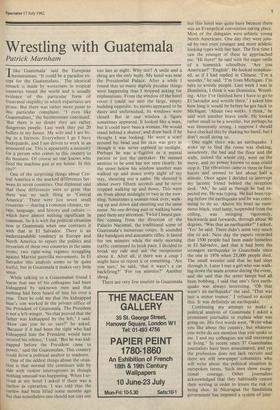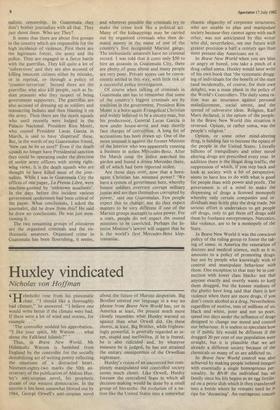Wrestling with Guatemala
Patrick Marnham
`T like Guatemala' said the European 1businessman. 'It could be a paradise ex- cept for the Guatemalans.' The identical remark is made by westerners in tropical countries round the world and is usually evidence of the particular form of frustrated stupidity to which expatriates are Prone. But there was rather more point to this particular complaint. 'I even like Guatemalans,' the businessman continued. `But there is no doubt they are rather dangerous people. Last week they put 20 bullets in my house. My wife and I are liv- ing in a fortress. Everywhere I go I have bodyguards, and I am driven to work in an armoured car. This is apparently a necessity for a person who comes to this country to do business. Of course no one knows who fired the machine gun at my house. In this city?'
One of the surprising things about Cen- tral America is the marked differences bet- ween its seven countries. One diplomat said that these differences were so great that there was no such thing as 'Central America'. There were just seven small countries — sharing a common climate, ter- rain, language, and history and culture which have almost nothing significant in common. So it is with the political situation now in Guatemala when one contrasts it with that in El Salvador. There is an understandable tendency in Europe and North America to report the politics and terrorism of these two countries in the same terms; two right-wing regimes struggling against Marxist guerrilla movements. In El Salvador this analysis seems to be quite useful, but in Guatemala it makes very little sense.
While talking to a Guatemalan friend I learnt that one of his colleagues had been kidnapped by unknown men and that nothing had been heard of him for over a Year. Then he told me that the kidnapped man's son worked in the private office of the President of Guatemala. The President is not a left-winger. `So that proved that the father was kidnapped by the left,' I said. `How can you be so sure?' he asked. `Because if it had been the right who had kidnapped him the President would have secured his release,' I said. 'But he was kid- napped before the President came to Power,' said the Guatemalan. This country could drive a political analyst to madness.
One of the oddest things about the situa- tion is that normal life continues side by side with violent interruptions as though nothing unusual was happening. When I ar- rived at my hotel I asked if there was a curfew in operation. I was told that the curfew had been lifted some months ago but that nonetheless one should not stay out too late at night. Why not? A smile and a shrug are the only reply. My hotel was near the Presidential Palace. After a while I found that so many slightly peculiar things were happening that I stopped asking for explanations. From the window of the hotel room I could see into the large, empty building opposite. Its rooms appeared to be dusty and unfurnished, its windows were closed. But at one window a figure sometimes appeared. It looked like a man, but it could have been a woman. He would stand behind a shutter, and draw back if he thought I was looking. He wore a scarf around his head and his skin was grey as though it was never exposed to sunlight. Perhaps he was a 'fugitive or a mental patient or just the caretaker. He seemed anxious to be seen but not seen clearly. In the street below his window another man walked up and down every night of my stay, shouting out a name. He shouted it about every fifteen seconds and he never stopped walking up and down. This went on from about midnight to two in the mor- ning. Sometimes a woman took over, walk- ing up and down and shouting out the same name. No one driving past or walking home paid them any attention. Twice I heard gun- fire coming from the direction of the Palacio Nacional, the traditional scene of Guatemala's numerous coups. It sounded like handguns and automatic rifles. It lasted for ten minutes while the early morning traffic continued its brisk pace. I decided to break my rule and ask the receptionist about it. After all, if there was a coup I might have to report it or something. 'Are you sure,' he said, 'that it wasn't a car back firing?"For ten minutes?' Another shrug.
There are very few tourists in Guatemala but this hotel was quite busy because there was an Evangelical convention taking place. Most of the delegates were athletic young North Americans. One day they were join- ed by two even younger and more athletic looking types with fair hair. The first time I saw the younger of these he approached me. 'Hi there!' he said with the eager smile of a homesick schoolboy. 'Are you American?"English'. He looked nonpluss- ed, as if I had replied in Chinese. 'I'm a wrestler,' he said. 'I'm from Michigan. I'm here to wrestle people. Last week I was in Dominica, I think it was Dominica. Wrestl- ing. After I've finished here I have to go to El Salvador and wrestle there.' I asked him how long it would be before he got back to Michigan. 'About two weeks. I think,' he said with another brave smile. He looked rather small to be a wrestler, but perhaps he was immensely strong. I suppose I should have checked this by shaking his hand, but I don't recall doing so.
One night there was an earthquake. I woke up to find the room was shaking, noiselessly, the bed and the floor and the walls, indeed the whole city, were on the move, and no power known to man could stop it. The vibrations came in three or four bursts and seemed to last about half a minute. Once again I decided to interrupt my laconic friend behind the reception desk. `Ah,' he said as though he had ex- pected me. He was typing. He had been typ- ing before the earthquake and he was conti- nuing to do so. Above his head an enor- mous black, steel lamp, suspended from the
ceiling, was swinging vigorously, backwards and forwards, through about 90 degrees. 'Was that an earthquake?' I asked. `Yes' he said. There didn't seem very much else to ask. Next day the papers recorded that 1500 people had been made homeless in El Salvador, and that it had been the strongest earthquake in Guatemala since the one in 1976 when 23,000 people died. The small wrestler said that he had slept through it. Later I met a girl who was walk- ing down the main avenue during the event, and she said that the street lamps had all been bobbing. I said that one's first earth- quake was always interesting. 'Oh that wasn't an earthquake' she said. 'That was just a minor tremor.' I refused to accept this. It was definitely an earthquake.
Continuing my attempt to make a political analysis of Guatemala I asked a prominent journalist to explain what was going on. His first words were, 'Write what you like about this country, but whatever you write do not mention that you spoke to me. I and my colleagues are still interested in living.' In recent years 37 Guatemalan journalists have been assassinated, and yet the profession does not lack recruits and there are still newspaper columnists who will write about the political situation in outspoken terms. Such men show excep- tional courage. Other journalists acknowledged that they habitually censor their writing in order to lessen the risk of being shot. In Nicaragua the Sandinista government has imposed a system of jour-
nalistic censorship. In Guatemala they don't bother journalists with all that. They just shoot them. Who are They?
It seems that there are about five groups in the country which are responsible for the high incidence of violence. First there are the legitimate forces, the army and the police. They are engaged in a fierce battle with the guerrillas. They kill quite a lot of `subversives' and they are also accused of killing innocent citizens either by mistake, or in reprisal, or through a policy of `counter-terrorism'. Second there are the guerrillas who also kill people, such as In- dian peasants who they suspect of being government supporters. The guerrillas are also accused of dressing up as soldiers and massacring Indians and then blaming it on the army. Then there are the death squads who until recently were lodged in the Palacio Nacional. President Rios Montt, who ousted President Lucas Garcia in March, is said to have 'dispersed' these. But, in the words of my Guatemalan friend, `how can he be so sure?' Even if the death squads no longer have Presidential sanction they could be operating under the direction of senior army officers with strong right- wing views. It is the death squads who are thought to have killed most of the jour- nalists. While I was in Guatemala City the offices of one paper, La Prensa Libre, were machine-gunned by 'unknown assailants'. In the days before this incident various government spokesmen had been critical of the paper. What conclusions, 1 asked the journalist, did he draw from this? He said he drew no conclusions. He was just men- tioning it.
The two remaining groups of pistoleros are the organised criminals and the en- thusiastic amateurs. Organised crime in Guatemala has been flourishing, it seems, and wherever possible the criminals try to make the crime look like a political act. Many of the kidnappings may be carried out by organised criminals who then de- mand money in the name of one of the country's five recognised Marxist gangs. The enthusiastic amateurs have no criminal record. I was told that it costs only $50 to hire an assassin in Guatemala City, there are plenty of guns about and many people are very poor. Private scores can be conve- niently settled in this way, with little risk of a successful police investigation.
Of course when talking of criminals in Guatemala one has to remember that some of the country's biggest criminals are by tradition in the government. President Rios Montt is a born-again Evangelical Christian and widely believed to be a sincere man, but his predecessor, General Lucas Garcia is now under house-arrest and may shortly face charges of corruption. A long list of accusations has been drawn up. One of the more unusual is against the former Minister of the Interior who was apparently running a business in stolen Mercedes-Benz. After the March coup the police searched his garden and found a dozen Mercedes there, all of which had been reported stolen.
Are those days over, now that a born- again Christian has assumed power? 'We have a system of government here, whereby honest soldiers overturn corrupt military juntas and are then themselves corrupted by power,' said one Guatemalan. Few people expect this to change; nor do they expect matters to be very different if one of the Marxist groups manages to seize power. For a start, people do not expect the ousted ministers to be convicted. Perhaps the In- terior Minister's lawyer will suggest that he is the world's first Mercedes-Benz klep- tomaniac.



































 Previous page
Previous page